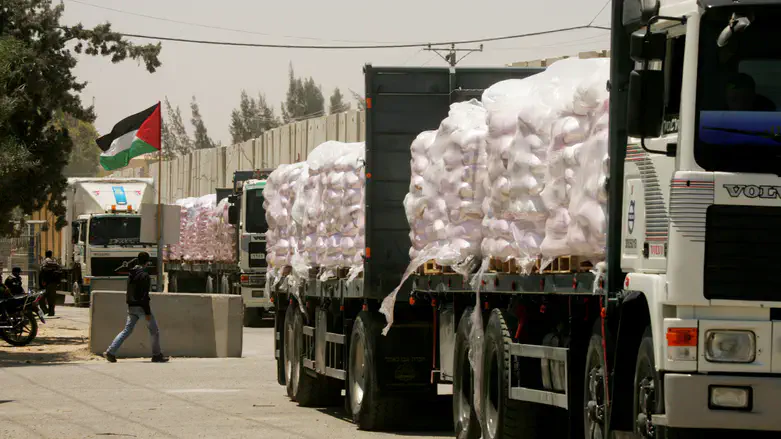
Black Lives Matter Less to UN World Food Programme Head Arif Husain
Arif Husain's disproportionate emphasis on Gaza inevitably causes the international community to neglect exponentially greater hunger problems, such as Nigeria with 26.5 m. people suffering famine. Op-ed.
- 2 minutes

The UN World Food Programme (UNWFP) admirably aims to bring "life-saving food to people displaced by conflict and made destitute by disasters," and to "help countries and communities prepare for and cope with climate-related shocks." Such a broad and important mandate is intrinsically global, so one would hope that this NGO distributed its resources and focus as fairly as possible, on a per capita basis, rather than preferring certain nationalities, religions, or races.
But Arif Husain, the Pakistani-American who heads the UNWFP, which he joined in 2003, has some very strong preferences that emerge from his Twitter feed and press statements. Husain clearly prioritizes hunger in Gaza over territories where exponentially more people have been affected by famine for far longer, according to the data published by his own organization. The website of the UNWFP alphabetically lists 14 territories with a food emergency; if they are ranked by the total number of people affected, Nigeria has the most (26.5 million) and Gaza has the least (1.1 million). Note that the UNWFP is hardly hostile to Gaza, to which it has already granted statehood (the UNWFP's page for Gaza is called "the State of Palestine").
Husain has tweeted more about hunger in Gaza than anywhere else since October 7th. Nearly all of Husain’s Twitter feed since then concerns Gaza, and his bias particularly stands out in his Tweet of November 23, 2023, where Husain notes that “Evil comes in all ways, shapes and forms!” and shares the infamous video of the ex-Obama official harassing a NY street vendor. While such harassment is indefensible by anyone (VIP or not), it’s hardly at the level of raping, burning, beheading, and massacring 1,200 people and abducting another 240; yet Hamas’ October 7th atrocities against Israel never inspired a single tweet about “evil” from Husain. Indeed, his Twitter feed is conspicuously silent from October 7th until October 15th, when he reposted about the need to help Gaza.
Because Husain is a widely quoted and respected figure, his obsessive focus on Gaza contributes to the disproportionate media coverage of and the global spotlight on hunger there. Indeed, as early as January 11, the New York Times noted this trend: “While hunger crises in regions such as South Sudan and Tigray have unfolded with little media attention, there is intense international scrutiny on Gaza.”
In the January 1 New York Times article titled “Half of Gazans Are at Risk of Starving, U.N. Warns,” Husain is quoted as saying, “I’ve been doing this for about 20 years…I’ve been to pretty much any conflict, whether Yemen, whether it was South Sudan, northeast Nigeria, Ethiopia, you name it. And I have never seen anything like this, both in terms of its scale, its magnitude, but also at the pace that this has unfolded.”
But the NYT article negligently publishes Husain’s sweeping claim without any further investigation, comparative analysis, or caveats. Both the NYT and Husain apparently forgot about two far bigger famines during Husain’s tenure: the 2003-5 famine that killed about 200,000 in Darfur, and the 2011 famine in Somalia that claimed 260,000 lives. By contrast, the United Nations Office for the Coordination of Humanitarian Affairs (OCHA) reported claims that “As of 12 March…27 people…have died of malnutrition and dehydration….in...Gaza.” While every starvation death is tragic, the UNWFP should have the basic ethical intelligence to prioritize hundreds of thousands over dozens.
The New York Times apparently shares Husain’s bias and moral blindspot. The same NYT article notes that, according to Mr. Husain, Gaza meets “at least the first criteria of a famine, with 20 percent of the population facing an extreme lack of food,” but the paper never asks Husain why he emphasizes that over the exponentially larger hunger emergency in Nigeria reported by his organization:
“Conflict and insecurity, rising inflation and the impact of the climate crisis continue to drive hunger in Nigeria – with 26.5 million people across the country projected to face acute hunger in the June-August 2024 lean season. This is a staggering increase from the 18.6 million people food insecure at the end of 2023.”
In other words, according to the UNWFP, in the last few months, the already huge number of Nigerians facing acute hunger (i.e., about nine times the entire population of Gaza) increased by 7.9 million, but the 20% of Gaza “facing an extreme lack of food” (i.e., 440,000 Gazans) deserve virtually all of Mr. Husain’s Twitter attention and priority in the New York Times interview he gave.
Mr. Husain's broken moral math reveals a bias that has no place in an organization ostensibly dedicated to addressing global challenges based on the greatest need, without favoritism for any country, religion, or race.
Arif Husain's disproportionate emphasis on Gaza inevitably causes the international community to neglect exponentially greater hunger problems. But since at least October 7th, for Mr. Husain and the UNWFP, Black lives matter much less than Gazan lives do.
Noah Beck is the author of The Last Israelis, an apocalyptic submarine thriller about Iranian nukes, Hamas, and Hezbollah.
UNFWP Website: